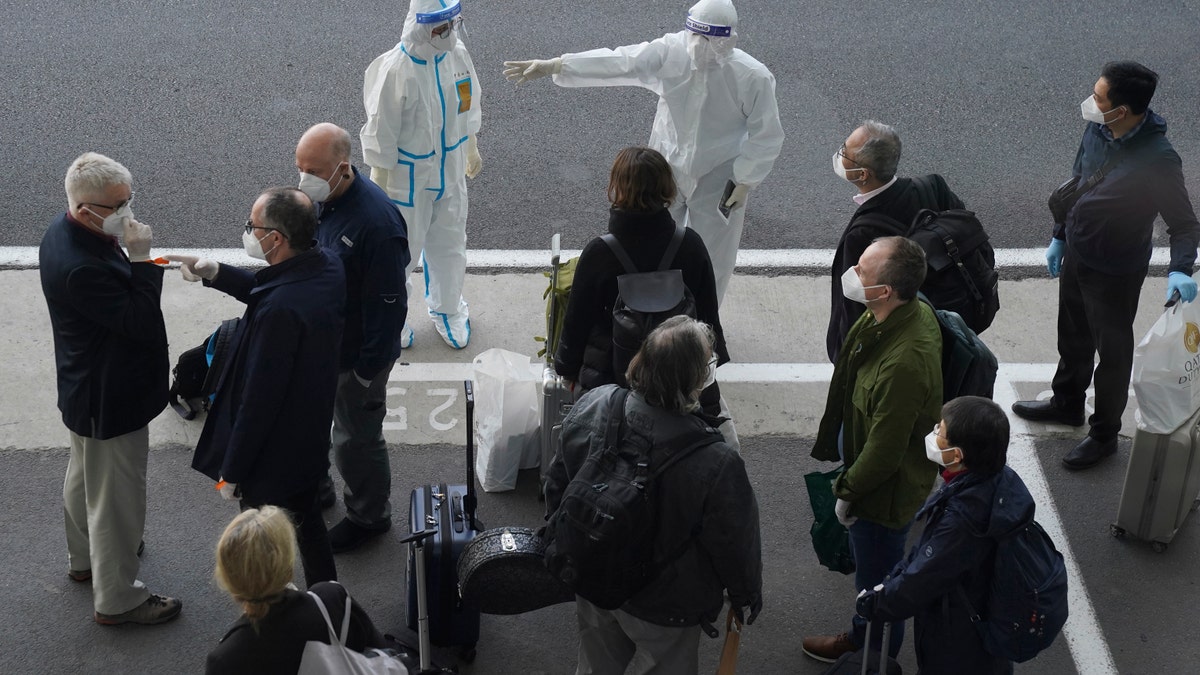China only major economy to show growth in 2020: report
Asia analyst Gordon Chang claims data released by China is not accurate, argues the nation’s National Bureau of Statistics engages in ‘outright fabrication’ and ‘technical manipulation.’
A year since the words "novel coronavirus" crept into news headlines, and over 2 million lives have been claimed as a result of the disease – officially termed COVID-19. Moreover, it has permeated every pocket of the planet, morphed into dozens of different strains, shuttered the world economy, overwhelmed health care resources, and rendered millions with unknown long-term ramifications.
But what is to say that another, entirely new pandemic could spawn at any moment? And in particular, what is China's leadership doing to prevent a disease emergence?
"At the moment, there is no safety mechanism, pressure or any strategy coming from the (incoming) Biden administration to ensure that another virus or pathogen" does not come from China, Harry Kazianis, a senior director at the Center for the National Interest, told Fox News. "And we should all be terrified as another coronavirus-like event could truly happen at any time."

The variant strain includes three mutations on the virus's surface spike proteins. (iStock)
Before the onset of COVID-19 late last year, the country was also the presumed origin point for the 1957 Asian flu and the Hong Kong flu in 1968, to the H5N1 avian influenza (bird flu) outbreak in 1996 and the 2003 severe acute respiratory syndrome (SARS) incursion – triggering a combined death toll well into the millions, as the various contagions tore through populations well beyond China's borders.
NEW COVID-19 STRAINS SHOWS POSSIBLE 'RESISTANCE' TO ANTIBODY, BUT NOT VACCINES
Specifically, scientists have honed in on the notion of "zoonotic" viruses as a prominent cause for concern for the emanation of new infectious diseases – meaning animal viruses being transmitted to humans and leading to a deadly pandemic. SARS 17 years ago is believed to have hatched from palm civets sold as a delicacy in southern Chinese markets, and the 1997 bird flu has been traced to fowl located in the south mainland.

A man wearing a face mask to protect against the spread of the coronavirus walks past a display of lanterns at a public park in Beijing, Tuesday, Jan. 5, 2021. China has designated parts of Hebei province near Beijing as a coronavirus high danger zone after 14 new cases of COVID-19 were found. (AP Photo/Mark Schiefelbein)
The roots of COVID-19 remain murky. Initially, it was thought that the pathogen came from a bat – common hosts for various viruses – that was consumed by a woman at a Wuhan seafood market. That theory was cast into public scrutiny by Trump officials last year with proclamations that the notion that it leaked from a laboratory under investigation.
However, a team of scientists appointed by the World Health Organization (WHO) to investigate the matter was denied entry into China earlier this month. But late last week, the UN-aligned global health body said that a team had since returned for two weeks of testing and information gathering, a probe that the Chinese Communist Party (CCP) had long resisted.
"Just like in the old Soviet Union, Chinese scientists know that they will never get promoted or move up the ranks of the Chinese Communist Party by reporting bad news, problems or challenges — or successes or things that will make the party look good are rewarded," Kazianis said. "Therefore, what scientist will speak out when another coronavirus is discovered out in the population or accidentally released? Doing what we consider the morally right thing is discouraged and looked down upon."
Indeed, China's soiled history with pandemics has called into question its public health practices and whether anything is being done to quell it from being a "perfect storm" for zoonotic diseases to thrive. The matter, analysts emphasize, has only been made worse by the lack of transparency emitted by the CCP and the top-down concerns of igniting internal unrest inside the world's most populous nation.
"Transparency is the only way the potential toll of another viral pandemic can be better dealt with. And this applies to transmission from within and especially from without," observed Kagya Amoako, associate professor of biomedical engineering at the University of New Haven. "What could (also) be helpful in preventing another catastrophic pandemic are better educational campaigns about infectious diseases especially in places of the world that need it the most, better reporting systems that allow prompt and anonymous reporting by physicians and qualified healthcare workers, better flow of case information across governments and private entities."
Craig Singleton, an adjunct fellow at the Foundation for the Defense of Democracies (FDD), agreed that it is "a near certainty we will experience pandemics like this one in the future."
"It is not a question of if, but when. The challenge with China is that the world maintains almost zero visibility into its network of highly secretive labs, to include any insight into their outbreak protocols," he explained. "This continued lack of transparency, and in some cases downright obfuscation, from the Chinese government has real-world consequences."
Even though infectious disease experts are continuing to warn that a pandemic of an entirely different nature could be brewing at any moment, little has changed from a public policy and political purview.
From the lens of Dr. Imran Sharief, a California-based pulmonary and critical care physician, one of the most pressing things the CCP can do is make a fervent effort to close down any existing wet markets.
"These markets are the birthplace of extremely dangerous viruses. They need to be abolished," he said. "We also need more veterinarians to identify these emerging viruses and for quarantine measures to happen in a timely manner. If we can do these three things in China, we can protect the world."
Instead, experts caution that people must expect that another zoonotic infection is somewhat inevitable – and all global health bodies and governments can be better prepared to detect and quell it early, with the goal of stopping a health crisis or epidemic from metastasizing into a pandemic.

A worker in protective coverings directs members of the World Health Organization (WHO) team on their arrival at the airport in Wuhan in central China's Hubei province on Thursday, Jan. 14, 2021. A global team of researchers arrived Thursday in the Chinese city where the coronavirus pandemic was first detected to conduct a politically sensitive investigation into its origins amid uncertainty about whether Beijing might try to prevent embarrassing discoveries. (AP Photo/Ng Han Guan)
Last week, American Medical Association (AMA) President Dr. Susan Bailey underscored in a national address that a "coordinated, comprehensive federal response" is pivotal, as is the need for a "science-based" basis for decision making.
Attila Hertelendy, an emergency management and health policy expert and an assistant professor at the Florida International University in Miami, concurred that the "threat still remains high" for another calamity from China.
"Large population density, and prior lax enforcement of public health standards in rural communities," he noted, adding that there needs to be an overall improvement in collaboration among global governments, as well as to enhancing data-sharing agreements so that information can be reported in real-time without delays.
And while China has disproportionately played proprietor to the new viruses that have materialized in the century past, it is hardly alone as a hotbed. A 2009 flu pandemic was linked back to a central Mexico pig farm, and the deadly Middle East Respiratory Syndrome (MERS) was tracked back to camels and bats in Saudi Arabia.
A Princeton University assessment published in 2003 surmised that an annual investment of $30 billion "should be enough to offset the costs of preventing another global pandemic." The report, compiled by a multidisciplinary outfit of epidemiologists, wildlife disease biologists, conservation practitioners, ecologists and economists, stressed that the two most significant factors of emerging pathogens are the destruction of tropical forests – often resulting in disease-hosting wildlife mixing dangerously close to human populations – and the wildlife trade.
"Each has contributed two of the four emerging diseases that have appeared in the last 50 years: COVID, Ebola, SARS, HIV," the paper stated. "Both deforestation and the wildlife trade also cause widespread damage to the environment on multiple fronts, so there are diverse benefits associated with reducing them, note the researchers. Increased monitoring and policing of these activities would allow future emerging viruses to be detected at a much earlier stage when control could prevent further spread."
CLICK HERE TO GET THE FOX NEWS APP
The organization tasked with monitoring international wildlife trade -- the Convention on International Trade in Endangered Species of Wild Fauna and Flora (CITES) -- has a net global budget of just $6 million. Subsequently, many argue that the tracking of the wildlife trade requires far more money and resources.
"We are always susceptible to another virus strain that we don't have immunity from," added Hertelendy. "All countries have lessons that were learned, to what degree China will be willing to communicate a potential pandemic quicker in the future remains a diplomatic challenge."










































